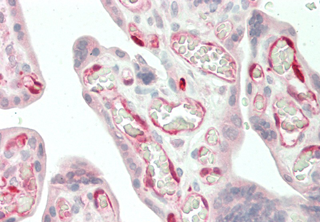
Immunohistochemical staining of IDO using anti-IDO (human), mAb (ID 177) (Prod. No. AG-20A-0035) in human placenta tissue (10microg/ml). This antibody has been tested in immunohistochemistry, analyzed by an anatomic pathologist and validated for u
anti-IDO1 (human), mAb (ID 177)

AG-20A-0035
ApplicationsWestern Blot, ELISA, ImmunoHistoChemistry
Product group Antibodies
ReactivityHuman
TargetIDO1
Overview
- SupplierAdipoGen Life Sciences
- Product Nameanti-IDO (human), mAb (ID 177)
- Delivery Days Customer10
- Antibody SpecificityRecognizes human IDO1. Detects a band of ~45kDa by Western blot. Other species not tested.
- ApplicationsWestern Blot, ELISA, ImmunoHistoChemistry
- CertificationResearch Use Only
- ClonalityMonoclonal
- Clone IDID 177
- Concentration1 mg/ml
- FormulationLiquid
- Gene ID3620
- Target nameIDO1
- Target descriptionindoleamine 2,3-dioxygenase 1
- Target synonymsIDO; IDO-1; INDO; indolamine 2,3 dioxygenase; indole 2,3-dioxygenase; indoleamine 2,3-dioxygenase 1; indoleamine-pyrrole 2,3-dioxygenase
- HostMouse
- IsotypeIgG1
- Protein IDP14902
- Protein NameIndoleamine 2,3-dioxygenase 1
- Scientific DescriptionIDO1 is a heme enzyme that catalyzes the first and rate-limiting step in the main pathway of human tryptophan catabolism, the kynurenine pathway, causing depletion of tryptophan which can lead to halted growth of microbes as well as T cells. IDO1 is an immune checkpoint protein, thought to play a role in a variety of pathophysiological processes such as antimicrobial and antitumor defense, neuropathology, immunoregulation and antioxidant activity. Cancer cells are able to evade the immune system is by hijacking the checkpoint proteins. Increased IDO1 protein levels drive growth arrest and apoptosis of the effector T cells, a group of immune cells that mediate the immune systems ability to destroy pathogens. By reducing the number of effector T cells, IDO1 overexpression prevents the immune system from effectively destroying cancer cells. IDO1 overexpression has been observed in a wide range of human cancers such as prostatic, colorectal, pancreatic, cervical, gastric, ovarian, head or lung cancer. Physiological IDO1 activity has been implicated in T cell tolerance to tumors, dysfunctional selftolerance in non-obese diabetic (NOD) mice, and as a protective negative regulator in autoimmune disorders. - Monoclonal Antibody. Recognizes human IDO. Detects a band of ~45kDa by Western blot. Other species not tested. Isotype: Mouse IgG1kappa. Clone: ID 177. Applications: ELISA, IHC, WB. Liquid. 0.2microm-filtered solution in PBS, pH 7.4. Contains no preservatives. IDO catalyzes the first and rate-limiting step in the main pathway of human tryptophan catabolism, the kynurenine pathway. Proinflammatory mediators, such as endotoxin and IFN-gamma induce the expression of IDO in several tissues. IDO-dependent suppression of T-cell responses might function as natural immunoregulatory mechanism. Physiological IDO activity has been implicated in T-cell tolerance to tumors, dysfunctional selftolerance in non-obese diabetic (NOD) mice, and as a protective negative regulator in autoimmune disorders.
- ReactivityHuman
- Storage Instruction-20°C,2°C to 8°C
- UNSPSC12352203
